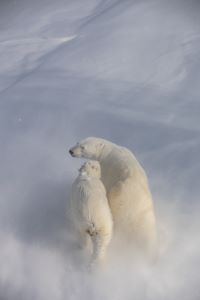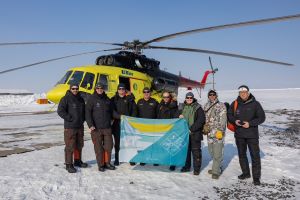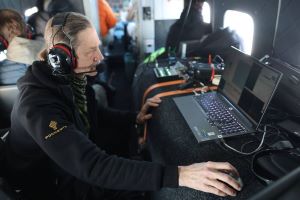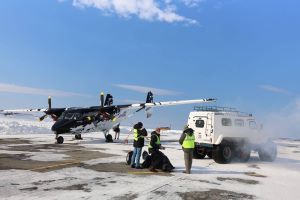Please activate JavaScript in your browser to use all interface options.
Rosneft Conducts Expeditions to Study Polar Bears
20 May 2025
Rosneft has conducted two scientific expeditions to study the populations of polar bears and other marine mammals in the Kara Sea. Specialists from the Severtsov Institute of Ecology and Evolution participated in fieldwork in northern Krasnoyarsk and on the Yamal Peninsula. The main objective of the research is to conduct a census and assessment of the distribution of polar bears and marine mammals on a large scale, using instrumental methods such as photographic and infrared aerial photography, as well as aerial visual methods.
The expeditions are being carried out as part of Rosneft’s Arctic biodiversity conservation programme called Tamura. The polar bear is a bioindicator species. Scientists use the health of these red-listed predators  to draw conclusions about the sustainability of northern ecosystems as a whole.
to draw conclusions about the sustainability of northern ecosystems as a whole.
A total of eight sorties were made from the settlement of Sabetta on Yamal using the AN-28 laboratory aircraft, in order to conduct a comprehensive survey of the inner delta of the Gulf of Ob and the south-eastern part of the Kara Sea.  The total length of the routes was almost 10,000 kilometres. More than 90,000 images were taken and will be processed using neural network algorithms. A total of 22 polar bears, 23 walruses, 616 seals and 77 beluga whales were recorded during aerial observations, as well as rare bird species.
The total length of the routes was almost 10,000 kilometres. More than 90,000 images were taken and will be processed using neural network algorithms. A total of 22 polar bears, 23 walruses, 616 seals and 77 beluga whales were recorded during aerial observations, as well as rare bird species.
Ten sorties were made by Mi-8MTV-1 helicopters from the Dikson settlement to survey the ice on several islands, as well as the ice in the Yenisei Bay, up to the Severn Bay, and along the northern coast of the Taymyr Peninsula, up to the mouth of the Uboynaya River. The total length of the routes was almost 5,000 kilometres.  A total of thirty-seven polar bears of various ages and sexes were recorded during the study. Fifteen adult bears were captured and ten of the animals were fitted with satellite and ear tags to enable their migration routes to be tracked remotely. The scientists also took blood and hair samples from the polar bears in order to investigate their health and genetic subpopulation status.
A total of thirty-seven polar bears of various ages and sexes were recorded during the study. Fifteen adult bears were captured and ten of the animals were fitted with satellite and ear tags to enable their migration routes to be tracked remotely. The scientists also took blood and hair samples from the polar bears in order to investigate their health and genetic subpopulation status.
For reference:
Rosneft and the Russian Ministry of Natural Resources are continuing their scientific research in the Arctic region as part of the National Ecology Project. Between 2024 and 2027, Rosneft intends to carry out research in northern Krasnoyarsk and the Kara Sea.
In 2024, the Company’s Arctic Research Centre organised five expeditions. During these, scientists studied the Kara subpopulation of polar bears, wild reindeer, and rare bird species. The total length of the air routes was almost 17,000 kilometres, while the total length of the water routes exceeded 3,000 kilometres.
Department of Information and Advertising
Rosneft
May 20, 2025

-315xx70.png)

